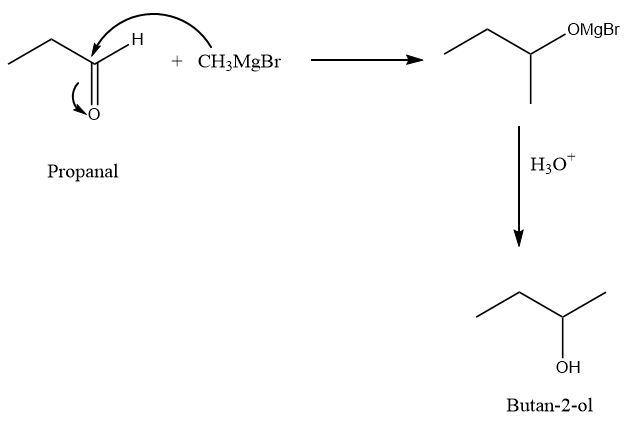Question
Question: How will you obtain \[{\rm{Butan}} - 2 - {\rm{ol}}\] from i) Propanal ii) \[{\rm{Butan}} - 2 - {...
How will you obtain Butan−2−ol from
i) Propanal
ii) Butan−2−one
iii) Butan−2−ene
Solution
Butan−2−ol is a secondary alcohol i.e., butane is substituted by a hydroxy group at second position, which appears as colorless liquid having an alcoholic odor. The vapors of the given alcohol are heavier than the vapors of air. It is easily soluble in water.
Complete answer: Preparation of Butan−2−ol from Propanal:
When Propanal is reacted with the Grignard reagent, the methyl group acts as a nucleophile and attacks at the carbonyl center of the compound due to which formation of an intermediate takes place. Later on, reaction with water in the acidic medium converts the intermediate compound into Butan−2−ol. The reaction proceeds as follows:

Preparation of Butan−2−ol from Butan−2−one:
The ketone group of Butan−2−one on reduction in the presence of lithium aluminium hydride and ether, converts into a hydroxyl group. Hence formation of Butan−2−ol takes place. The reaction proceeds as follows:

Preparation of Butan−2−ol to Butan−2−ene:
On hydrolysis of Butan−2−enein the presence of an acid, the reaction follows Markovnikov’s electrophilic addition i.e., electronegative part will be bonded to the more substituted carbon atom. Hence, the hydroxyl group which is an electronegative part of water will attack second carbon of given unsaturated alkene and formation of Butan−2−ol takes place. The reaction proceeds as follows:

Note:
On bromination of Butane in the presence of light, 2−bromobutaneis formed which is an isomer of monobromo derivative of butane. Then, on reacting 2−bromobutane with NaOH, removal of sodium chloride takes place and a hydroxyl group is introduced at the second carbon of butane. Hence, Butan−2−ol can alternatively be prepared from Butane.
